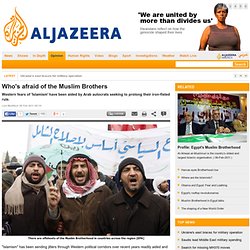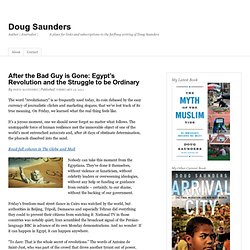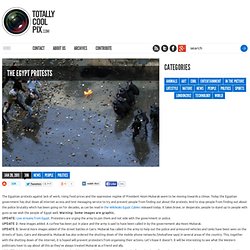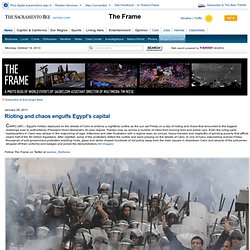

Post-Mubarak revolutionary chances. The Egyptian revolution has already achieved extraordinary results: after only eighteen intense days of dramatic protests.

It brought an abrupt end to Mubarak's cruelly dictatorial and obscenely corrupt regime that ruled the country for more than thirty years. It also gained a promise from Egyptian military leaders to run the country for no more than six months of transition - the minimum period needed for the establishment of independent political parties, free elections and some degree of economic restabilisation. It is hoped that this transition would serve as the prelude to, and first institutional expression of, genuine democracy. The Republic of Tahrir - An FP Slide Show. Les Frères musulmans et la révolution égyptienne: réalité contre fiction » Article » OWNI, Digital Journalism. Les Frères musulmans sont-ils sur le point de prendre le pouvoir en Égypte pour y imposer un régime islamique?

Christopher Anzalone, universitaire spécialiste de l'islam, nuance les inquiétudes agitées en occident. Traduction d’un article de Christopher Anzalone, doctorant à l’Institut d’études islamiques de l’université McGill, Montréal, paru sur le blog de Juan Cole, Informed Comment, le 9 février 2011. Depuis le début des protestations populaires égyptiennes contre le gouvernement autocratique dirigé par le président vieillissant Hosni Moubarak et son nouveau vice-président, Omar Suleiman, l’attention s’est souvent portée sur les Frères musulmans d’Égypte (al-Ikhwan al-Muslimun). Déclarer qu’Al-Qaida serait une émanation de la Confrérie est la plus importante des énormités prononcées. Ce qu’on oublie souvent c’est que ces individus ont quitté la Confrérie après que celle-ci ait rejeté la violence comme moyen d’arriver à ses fins.
Who's afraid of the Muslim Brothers. "Islamism" has been sending jitters through Western political corridors over recent years readily aided and abetted by Arab autocrats who have exaggerated and harnessed the "Islamist" threat to prolong their iron-fisted rule.

In the case of Egypt, the biggest bogeyman in this long-running battle over political supremacy with the state is the Muslim Brotherhood (the Ikhwan al-Muslimun) whose influence extends across the Arab and Islamic world. With the Middle East and North Africa currently convulsed by popular uprisings against political repression, the Muslim Brotherhood has been thrust into the limelight, not only by those seeking a better insight into the origins and goals of the movement as they try to peer into Egypt's future, but also by those whose entire raison d'etre consists of demonising the Ikhwan for ulterior political ends.
"I'm fed up" of ruling Egypt, complained Hosni Mubarak to an American news channel on February 4 as protests against his 30-year presidency accelerated. After the Bad Guy is Gone: Egypt’s Revolution and the Struggle to be Ordinary. The word “revolutionary” is so frequently used today, its coin debased by the easy currency of journalistic clichés and marketing slogans, that we’ve lost track of its true meaning.

On Friday, we learned what the real thing feels like. It’s a joyous moment, one we should never forget no matter what follows. The unstoppable force of human resilience met the immovable object of one of the world’s most entrenched autocrats and, after 18 days of obstinate determination, the pharaoh dissolved into the sand. Read full column in The Globe and Mail Nobody can take this moment from the Egyptians. Friday’s freedom-mad street dance in Cairo was watched by the world, but authorities in Beijing, Tripoli, Damascus and especially Tehran did everything they could to prevent their citizens from watching it: National TV in those countries was notably quiet; Iran scrambled the broadcast signal of the Persian-language BBC in advance of its own Monday demonstrations. The Egypt Protests. The Egyptian protests against lack of work, rising food prices and the oppressive regime of President Hosni Mubarak seem to be moving towards a climax.

Today the Egyptian government has shut down all internet access and text messaging service to try and prevent people from finding out about the protests. And to stop people from finding out about the police brutality which has been going on for decades, as can be read in the Wikileaks Egypt Cables released today. It takes brave, or desperate, people to stand up to people with guns so we wish the people of Egypt well. Warning: Some images are graphic.UPDATE: Live streams from Egypt. Protesters are urging the army to join them and not side with the government or police.UPDATE 2: New images added. The Egypte Protests the Egypte Protests Part 2 the Egypte Protests Part 3 101. 202. 303. 404. 505. 606.
Rioting and chaos engulfs Egypt's capital. Police gather in Tahrir Square as a car burns on January 28, 2011 in Cairo, Egypt.

Getty Images / Peter Macdiarmid Egyptian army armored vehicle are seen outside the television building following protests in Cairo, Egypt, Friday, Jan. 28, 2011. AP / Victoria Hazou Protestors attempt to get into Tahrir Square on January 28, 2011 in downtown Cairo, Egypt. Getty Images / Peter Macdiarmid Egyptian anti-government activists chant slogans as they confront riot police during a protest on the May 15 bridge in Cairo, Egypt, Friday, Jan. 28, 2011.